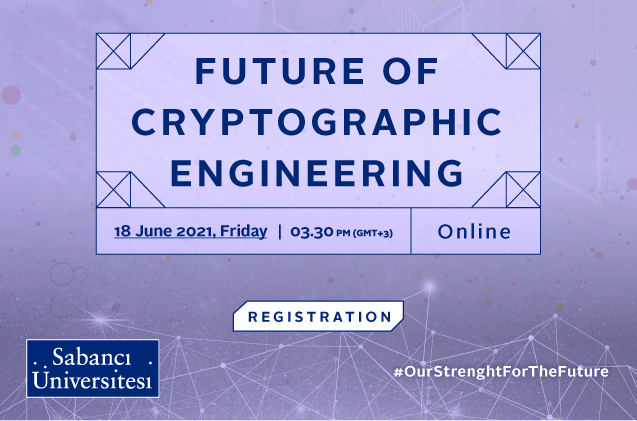09/06/2021
Sabancı University Faculty of Engineering and Natural Sciences will hold a special webinar entitled the “Future of Cryptographic Engineering” on June 18, 2021. The webinar will be online, and adding a different flavor to the usual online events, it will be held taking into account 4 different time zones convenient for the 6 scholars from 4 countries.

Organized by Sabancı University considering the recently growing importance of cryptography, the “Future of Cryptographic Engineering” webinar will host world-renowned scholars in the field from Germany, the USA, Belgium and Mexico, who will share not only the results of their most recent work, but also their past experience and their visions for the future.
Ranking first among Turkish universities and in the bracket of 201-250 among 827 world universities in the subject of Computer Science according to the 2021 Times Higher Education (THE) World University Rankings by Subject, Sabancı University aims to share expertise and know-how in the fields of computer science, engineering and technology with every segment of society, and to disseminate science.
World-Renowned Scholars in the field of Cryptography Coming Together
In the real world, there are many obstacles to the secure, fast, efficient implementations of cryptographic techniques and algorithms in hardware and software. Organized to raise awareness and share the most recent developments in the field of cryptographic engineering, the “Future of Cryptographic Engineering” webinar will host scholars from around the world, who will attend the event from their respective countries and time zones to talk about the evolution and future of cryptographic engineering, in addition to their academic work in the field.
The webinar will start at 15:30 on June 18, 2021. Prof. Ingrid Verbauwhede, who leads the embedded systems team in the COSIC Research Group at the Department of Electrical Engineering at KU Leuven, will speak at 15:45; Thomas Eisenbarth, Professor of IT security at the University of Lübeck at 16:20; Patrick Schaumont, Professor of Computer Engineering at WPI at 16:55; Christof Paar who, together with Gilles Barthe, is the founding director of the Max Planck Institute for Security and Privacy in Bochum, Germany, and research professor at the University of Massachusetts Amherst at 17:45; Francisco Rodriguez-Henriquez, professor in the Computer Science Department of the Advanced Research Center in Mexico City at 18:20; and Aydın Aysu, assistant professor at the Electrical and Computer Engineering Department of North Carolina State University at 18:55.
Why has cryptographic engineering come to prominence?
Being a set of mathematical methods to a great extent, cryptography has come to prominence as it proves to be an enabler for many advanced applications such as blockchain and privacy-preserving processing of data, including personal data. Thus, we are likely to see rapidly increasing use and importance of cryptography in the immediate future as digital technologies become an essential part of our daily lives, especially with the pandemic.
In this context, cryptographic engineering, which covers all work involving accurate, fast and secure implementation of cryptographic algorithms, which constitute the basis of cybersecurity, is playing an essential role.
Organized to bring together world-renowned scholars in the field of cryptographic engineering to enable exchange of the most recent scientific studies, the webinar is expected to raise awareness of the importance of cryptographic engineering, which provides security of online applications as a matter frequently highlighted during the pandemic
To register for the online webinar on the “Future of Cryptographic Engineering”, please visit https://www.sabanciuniv.edu/tr/event-detail/future-of-cryptographic-engineering-webinar-23146
The “Future of Cryptographic Engineering” Webinar
Program
Friday, June 18 2021
15:45 Ingrid Verbauwhede, Belgium
Recent Result with EM attacks: Passive observation and active perturbation
16:20 Thomas Eisenbarth, Germany
Isolated Execution Environments as a Building Block for Secure Systems
16:55 Patrick Schaumont, USA
Hardening Software against Implementation Attacks using Parallel Synchronous Programming
17:45 Christof Paar, Germany
Hardware Security in the Age of Large-Scale Adversaries
18:20 Francisco Rodríguez-Henríquez, Mexico
How Long Can We Safely Use Pre-Quantum ECC (Elliptic Curve Cryptography)?
18:55 Aydın Aysu, USA
The Future of Physical Side-Channel Analysis: The next decade






